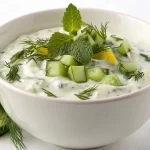Cold beet soup has roots in Eastern European cuisine, particularly in Lithuania, Poland, and Belarus, where it is known as šaltibarščiai or chłodnik. Traditionally, it was made with boiled beets, fermented dairy (like kefir or buttermilk), and fresh herbs from summer gardens. It was valued for being refreshing, nutritious, and easy to prepare during the hotter months when heavy meals were less desirable.
Preparation Time
- Prep Time: 15 minutes
- Cooking Time: 25 minutes (for beets)
- Chilling Time: 1 hour
- Total Time: ~1 hour 40 minutes
- Servings: 4
Ingredients
- 3 medium beets, boiled or roasted, peeled and grated
- 2 cups plain Greek yogurt (unsweetened, low-fat or whole as preferred)
- 1 cup kefir or buttermilk (optional, for extra tang)
- 1 cucumber, finely diced
- 2 green onions, chopped
- 2 tablespoons fresh dill, chopped
- 2 tablespoons lemon juice
- 1 teaspoon sea salt (adjust to taste)
- Freshly ground black pepper
- 2 boiled eggs, halved (for garnish, optional)
- Fresh parsley or dill sprigs for garnish
Cooking Instruments Used
- Medium saucepan (for cooking beets)
- Cutting board & knife
- Grater
- Mixing bowl
- Ladle
Instructions
- Prepare the beets
Boil or roast beets until tender (25–30 minutes boiling, 40 minutes roasting). Peel and grate once cooled. - Mix the base
In a large bowl, combine Greek yogurt with kefir or buttermilk (if using). Stir in lemon juice, salt, and pepper. - Add vegetables and herbs
Mix in grated beets, cucumber, green onions, and dill. Stir well until the soup turns a vibrant pink. - Chill
Refrigerate for at least 1 hour before serving to allow flavors to meld. - Serve
Garnish with fresh herbs and half a boiled egg for protein and tradition.
Estimated Nutritional Value (Per Serving)
| Nutrient | Approx. Amount |
|---|---|
| Calories | 160 kcal |
| Protein | 10 g |
| Carbohydrates | 22 g |
| Fiber | 4 g |
| Fat | 4.5 g |
| Saturated Fat | 2.5 g |
| Sodium | 350 mg |
| Vitamin C | 25% DV |
| Vitamin A | 10% DV |
| Folate | 27% DV |
| Calcium | 20% DV |
| Potassium | 22% DV |
Health Benefits
- Supports gut health
Yogurt and kefir contain probiotics that enhance digestion and gut microbiome balance.
Reference: Marco ML et al. Health benefits of fermented foods: microbiota and beyond. Curr Opin Biotechnol, 2017. - Rich in antioxidants
Beets provide betalains, which reduce oxidative stress and inflammation.
Reference: Clifford T et al. The potential benefits of beetroot supplementation in health and disease. Nutrients, 2015. - Cardiovascular protection
Dietary nitrates in beets may help lower blood pressure and improve circulation.
Reference: Siervo M et al. Inorganic nitrate and blood pressure. Hypertension, 2013. - Bone and muscle support
Yogurt supplies calcium and protein for strong bones and muscle maintenance.
Reference: Rizzoli R. Nutritional influence on bone. Calcif Tissue Int, 2014.
Healthy Tips
- For a lighter version, use low-fat Greek yogurt.
- For a vegan alternative, replace yogurt with unsweetened soy or coconut yogurt and kefir with oat-based kefir.
- Add a sprinkle of chia or flaxseeds for omega-3 boost.
- Roast beets instead of boiling for a sweeter, deeper flavor.







0 comments on “Cold Beet and Yogurt Soup (Poland)”Add yours →